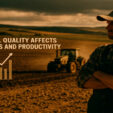How Regional Soil Quality Affects Farming Loans and Productivity
Soil quality shapes the very foundation of agricultural success, influencing everything from crop yield potential to the financial strategies farmers must adopt. A region’s soil fertility, structure, and chemical balance determine not only the types of crops that can be grown but also the scale of investment needed in inputs like fertilizers, irrigation systems, and soil amendments. In areas with naturally rich soil, farmers may achieve high productivity with minimal external support. In regions with degraded or nutrient-poor soils, significant capital is often necessary just to maintain competitive yields, which directly impacts loan requirements. Understanding the interplay between soil conditions and financing helps producers secure the right funding, manage risks, and plan for sustainable growth in competitive markets.


